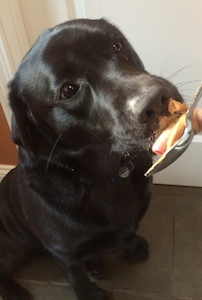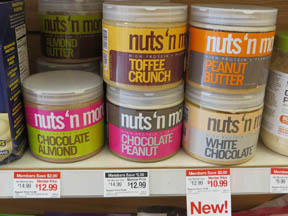
VIN News Service photo
Like many dogs, Chloe, a black Lab in Ohio, gets peanut butter as a treat. The use in some peanut butters of xylitol, a sugar substitute toxic to dogs, causes concern among veterinarians and other dog lovers.
Xylitol, a sugar substitute toxic to dogs, is being used in peanut and other nut butter brands typically marketed in health-food stores, posing a risk to pets that may be fed the products by their unsuspecting owners.
At least five companies add xylitol to peanut butters. The brand names are Go Nuts, Hank's Protein Plus Peanut Butter, Krush Nutrition, Nuts 'n More and P28.
A naturally occurring alcohol in plants, xylitol is safe for people but not dogs because of differences in metabolism. Depending on the dose, dogs that consume xylitol may develop a range of ills, from mild hypoglycemia to liver failure, which can be fatal.
Peanut butter is a common treat for dogs, and often used to make pills palatable. Xylitol’s appearance in peanut butters raises concern among veterinarians, especially those in emergency medicine and toxicology.
"A lot of people wouldn't think twice if their dog got into a jar of peanut butter," said Dr. Jason Nicholas, founder of Preventive Vet, a website devoted to helping pet owners avoid preventable accidents, poisonings and illnesses. "If it's a jar containing xylitol, it's likely to kill."
Xylitol poisonings in dogs appear to be on the rise. The number of reports to the ASPCA Animal Poison Control Center has more than doubled since 2007, when the center first began tracking calls, according to the center medical director Dr. Tina Wismer. In 2014, the center received 3,727 xylitol-related calls. The actual number of cases is likely much higher than that, Wismer said, because some veterinarians have treated enough cases that they no longer call the center for guidance.
Xylitol by any other name is still toxic to dogs
Wismer contacted manufacturers of the xylitol-containing peanut butters in early August hoping to learn the xylitol concentrations in each. The information helps Animal Poison Control Center staff to assess the severity of cases of xylitol ingestion. So far, the maker of only one brand — Hank's Protein Plus — has responded, Wismer told the VIN News Service.
Nicholas, a general practitioner in Oregon, reached out to the company behind Nuts ‘n More after its owners appeared on the reality television show “Shark Tank,” successfully persuading a pair of investors to invest in their products.
In an email to the company, Nicholas offered congratulations on its growth and products, which are promoted as more healthful for people, owing to fortified protein content and Omega-3 fats. Then he wrote:
“While this is a great addition for the people your butters are intended for, many of those same people also likely have dogs and many will frequently give their dogs peanut butter as a treat or to help administer medications. Normally this practice is quite safe, but since xylitol is highly toxic to dogs, it would prove dangerous if the peanut butter they give is yours.”
Nicholas told the company he was preparing an article to alert dog owners to the dangers of xylitol in nut butters, and asked, “Would you be willing to commit to adding a conspicuous warning to your labels and to your website …?” He offered, “I’d love to write the article as a piece also highlighting your team for excellent corporate responsibility and social goodwill towards pet owners.”
He received no answer. About a week later, on May 28, Nicholas posted the article. It went viral. To date, Nicholas said, nearly half a million people have read it. The piece has been shared on Facebook 177,000 times and Tweeted more than 1,200 times.

VIN News Service photo
Nuts ’n More products are among several nut spreads containing xylitol, a sugar substitute safe for people but potentially poisonous to dogs.
On June 10, Nicholas heard from Nuts ‘n More owner Dennis Iannotti. He was not pleased. According to Nicholas, Iannotti stated that Nicholas had not received permission to use the company’s name or images of its nutritional label, which Nicholas had downloaded from the website, and that the company was receiving "abusive emails and messages from people due to this." Iannotti wanted the article removed from the Preventive Vet website and threatened legal action if it was not.
The exchange ultimately led to productive discussions between the two sides, Nicholas reported. He said Iannotti agreed to place notices on the product label and website about the risk to dogs. The new labels aren’t yet in the marketplace. On the website, one drop-down menu and two clicks beyond the home page, this notation appears on the FAQ page under the question "What is xylitol?": "Even though Xylitol has many benefits to humans, it maybe harmful to dogs. Please be aware."
Nicholas said, "While we wish some of their wording and execution were more clear and definitive, these changes are definitely a step in the right direction and are encouraged."
Iannotti did not respond to requests for comment from the VIN News Service.
Nicholas has contacted the other brands' manufacturers, as well. The maker of P28 responded by adding information on the FAQ section of its website. The passage reads: "Xylitol is a natural sugar alcohol, and is safe for human consumption. However, xylitol can be harmful to your canine pals (dogs) and should be kept away so they cannot consume it. If you do however suspect your dog has ingested any food containing xylitol, we recommend you immediately contact your local veterinarian."
Nicholas said he plans to again approach the other companies. Preventive Vet is soliciting signatures for petitions to manufacturers and the U.S. Food and Drug Administration requesting labeling changes.
Nicholas said he would like to see warnings on product labels and xylitol concentrations specified or at least available to the Animal Poison Control Center.
Examples of products containing xylitol
Nicholas, who founded Preventive Vet in 2011, worries that xylitol is creeping into more products that people give to or use on their dogs. The ingredient can be found in items sometimes recommended for patients by veterinarians, including an antihistamine, fish oil, melatonin and vitamin B12.
Wismer likewise has witnessed the spread of xylitol. "OTC melatonin and kids' gummy vitamins, those have really high amounts of xylitol in them," she said. "We're running into more problems with those type of products."
Beyond its use as a sweetner, xylitol acts as a humectant, meaning it retains or preserves moisture. It sometimes appears in non-food products such as shampoos and lotions, although usually in minute concentrations that, if accidentally ingested by a dog, should not be problematic.
"The other ingredients will have the animal vomiting before there's any damage," Wismer said.
Xylitol is even in a dog shampoo designed to reduce itching, redness and skin dryness. Dermoscent's ATOP 7® Shampoo contains concentrations between 0.05 to 0.1 percent — a negligible amount. Wismer said a 10-pound dog drinking the entire seven-ounce bottle of ATOP would not consume enough xylitol to cause illness.
In ingestion cases where xylitol concentrations are high enough to be harmful, treatment for its most severe effects may be extensive and expensive.
"Liver failure is a horrific thing for a dog to have to suffer through," Nicholas said, noting that the liver serves multiple functions. "Because the liver is involved in so many things, when it shuts down, dogs can suffer a wide array of abnormalities. Blood-clotting problems, decreased protein production, and the ability to detoxify blood, along with a host of other systems, are all affected. They can bleed anywhere — eyes, brain, lungs — and if they bleed into their lungs, they suffocate. Liver failure can lead to a build-up of abdominal fluid. It can cause seizures. The liver is too vital an organ to be without."
Nicholas said he doesn’t fault manufacturers of products designed for people for not knowing about the risks of xylitol to dogs, but he wonders why they don't act when informed.
"How can you not be like, 'What can we do within reason to change?' " he asked. "Pet owners spend money. Why would you not want to curry favor with the pet-owning public?"